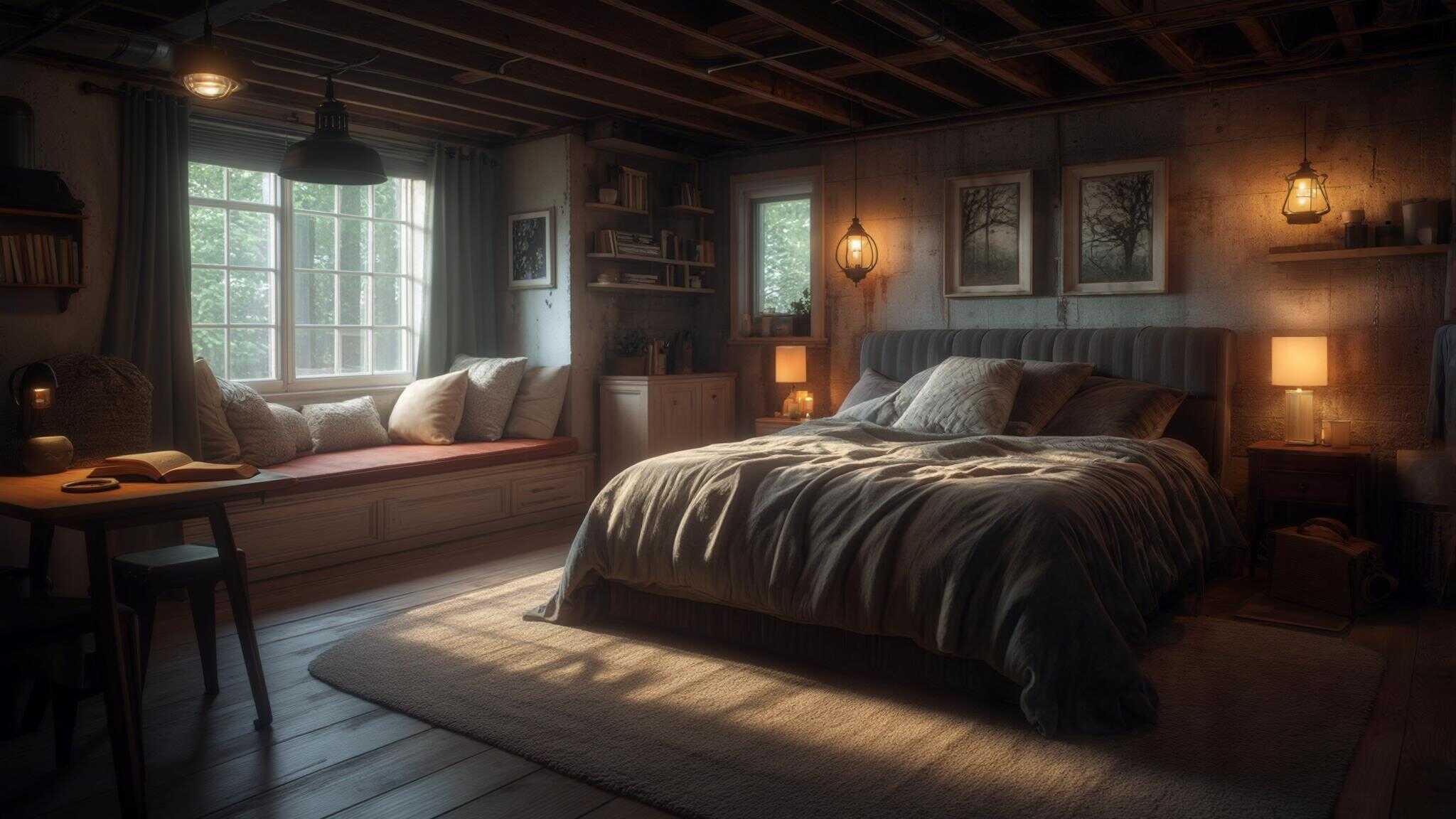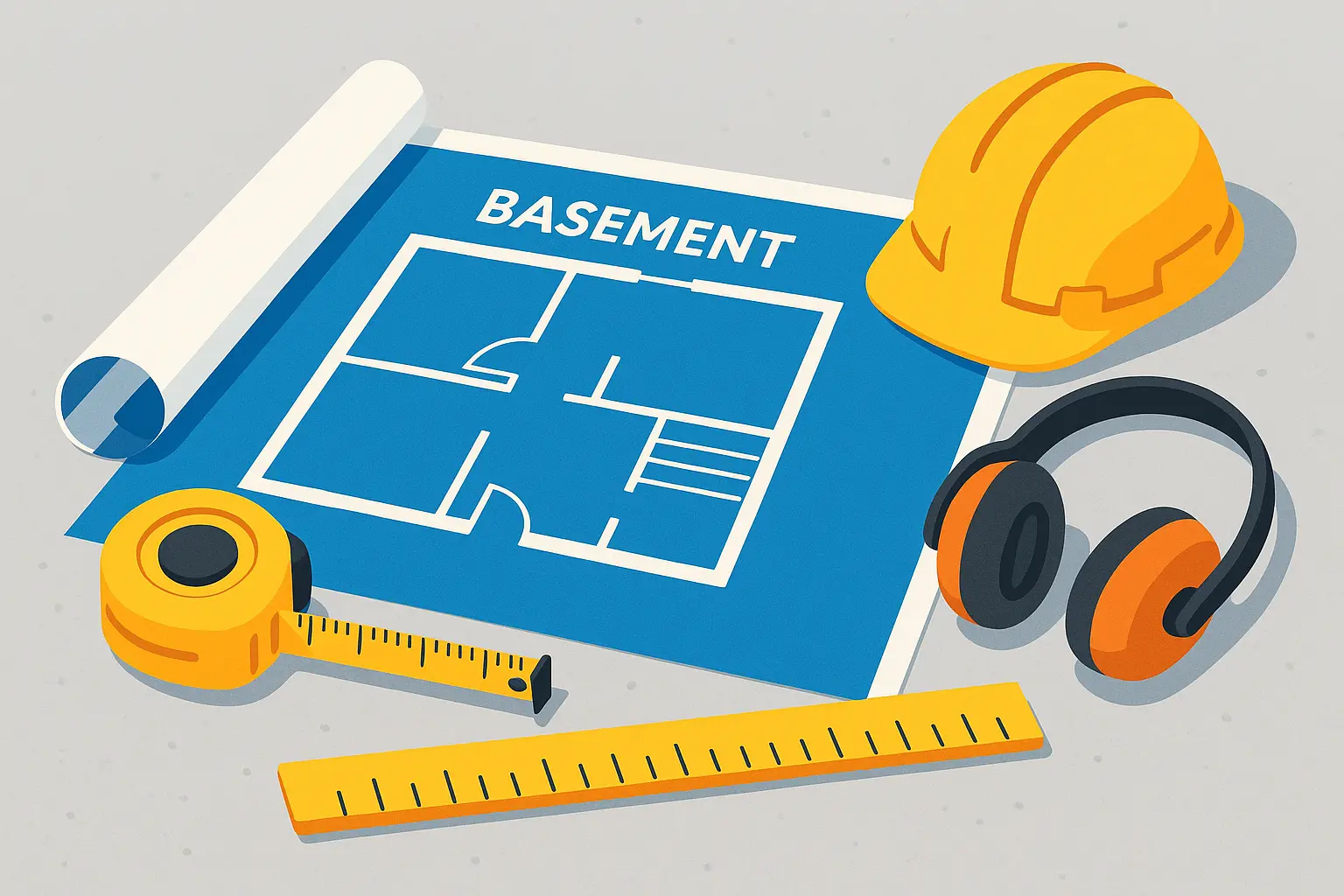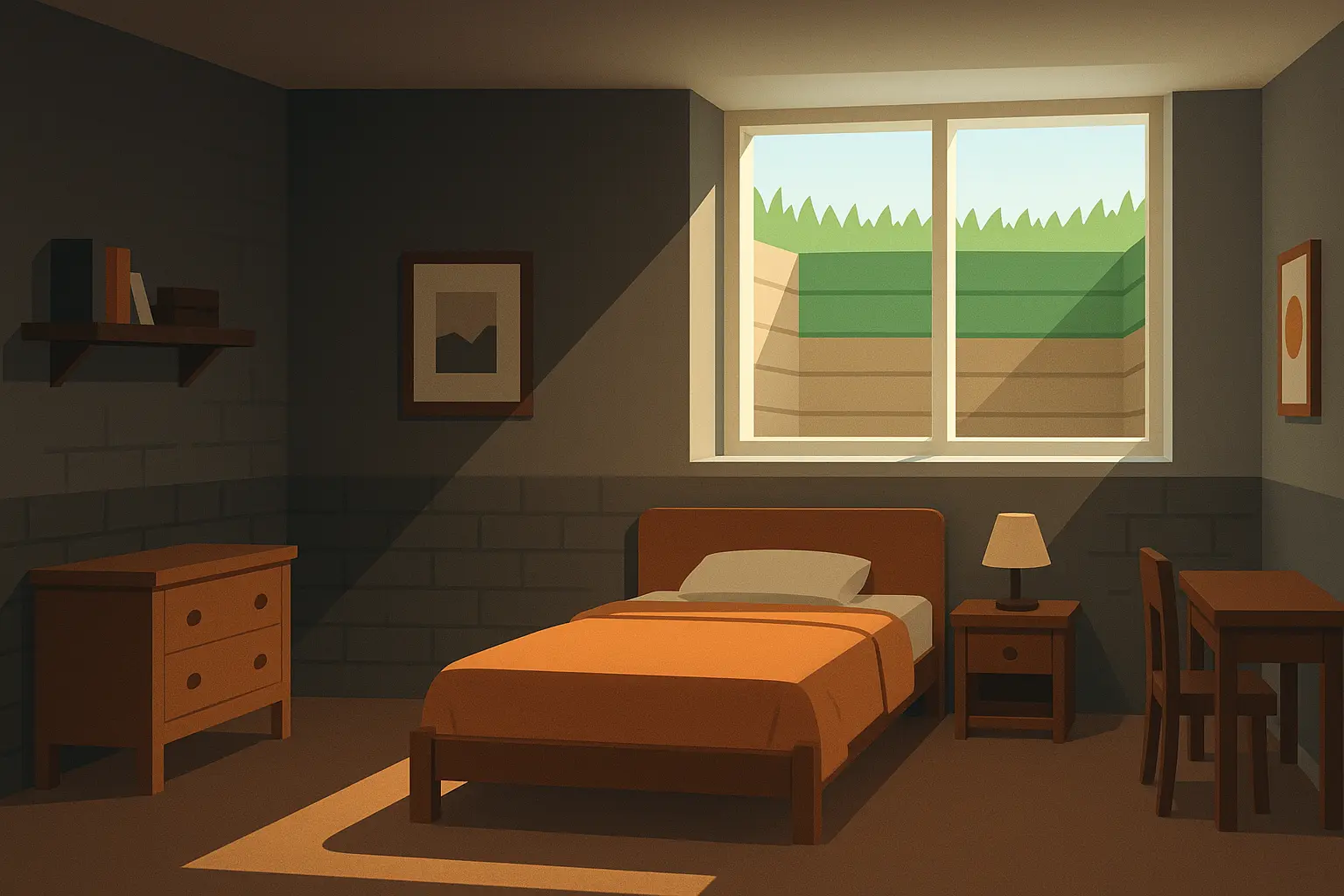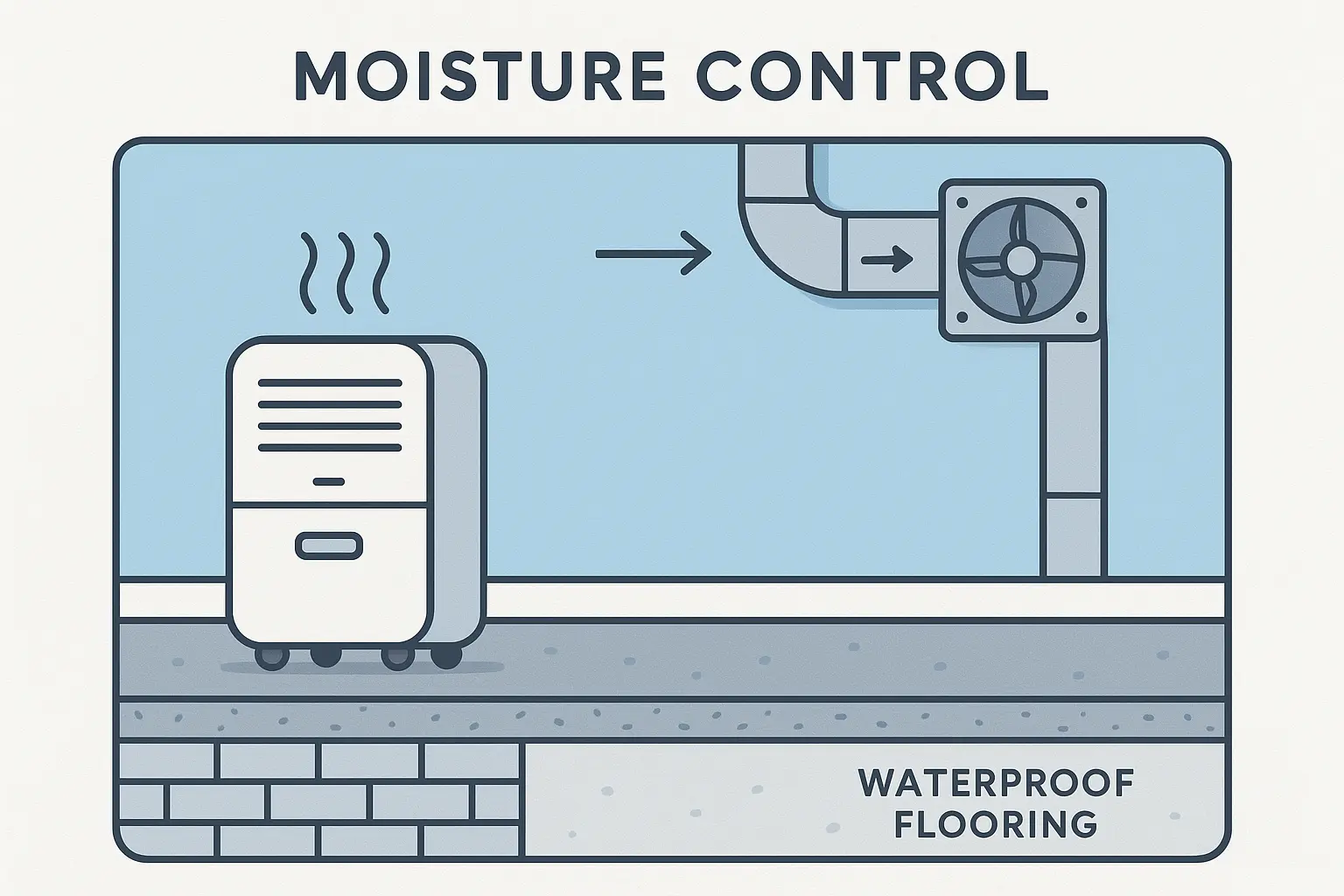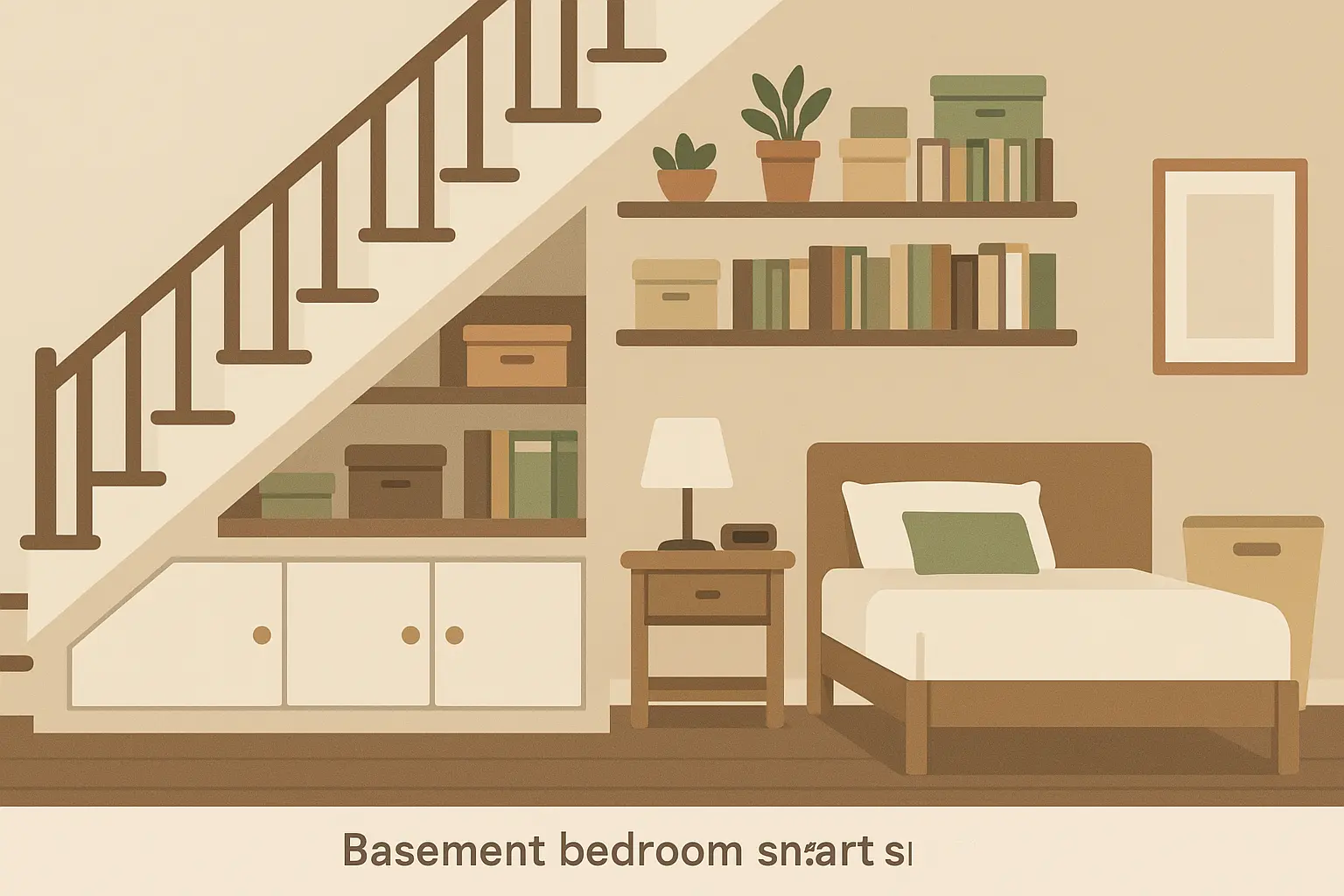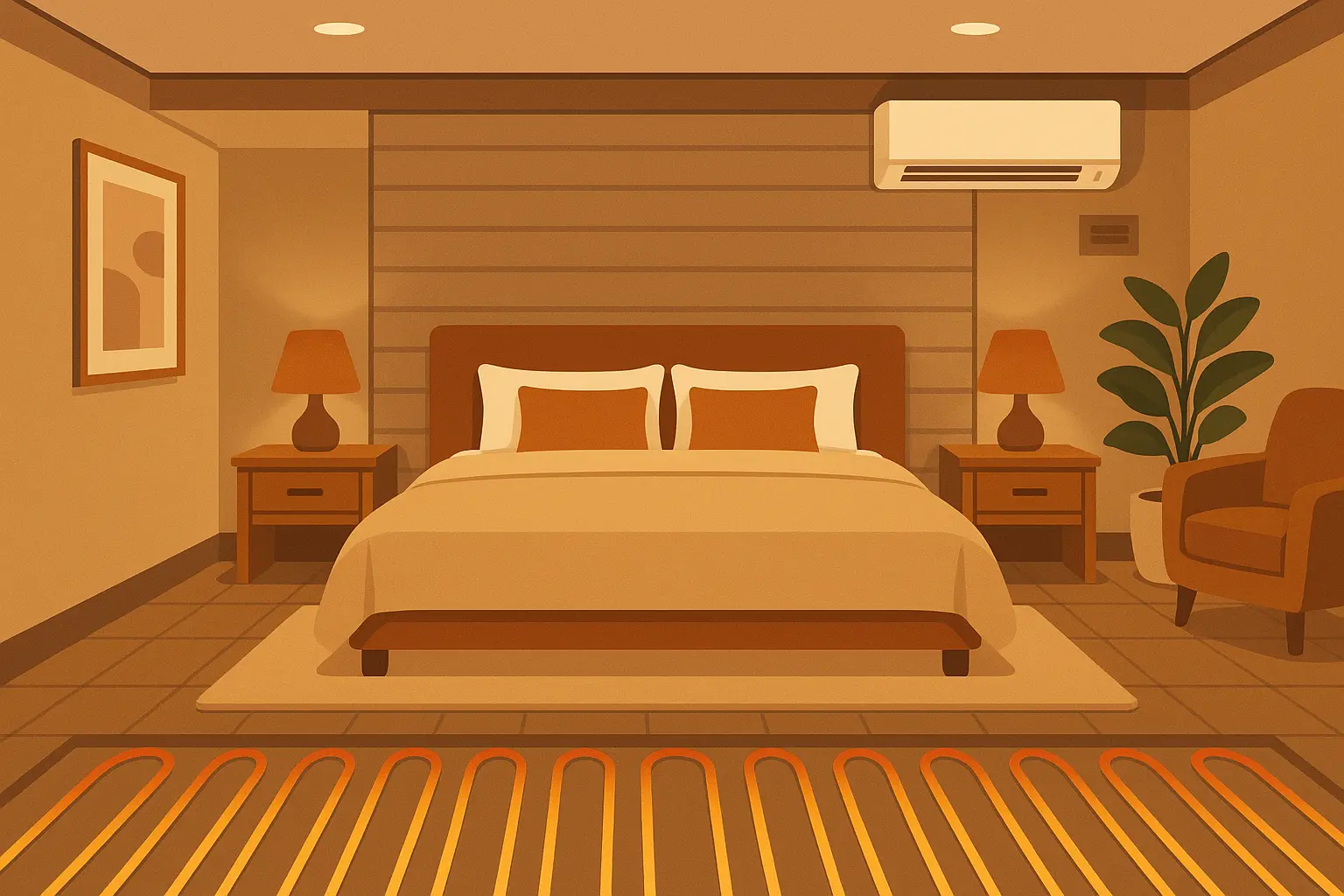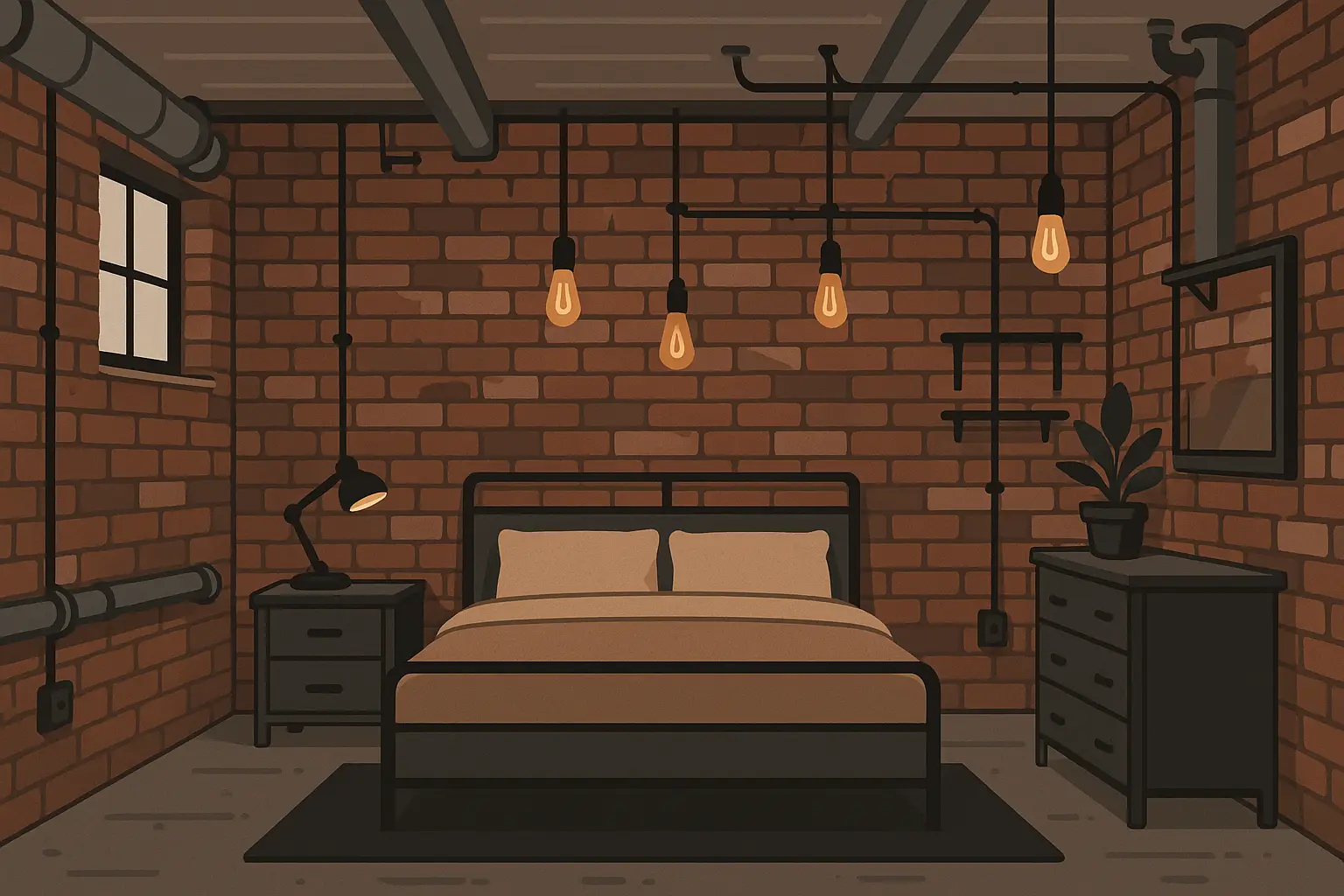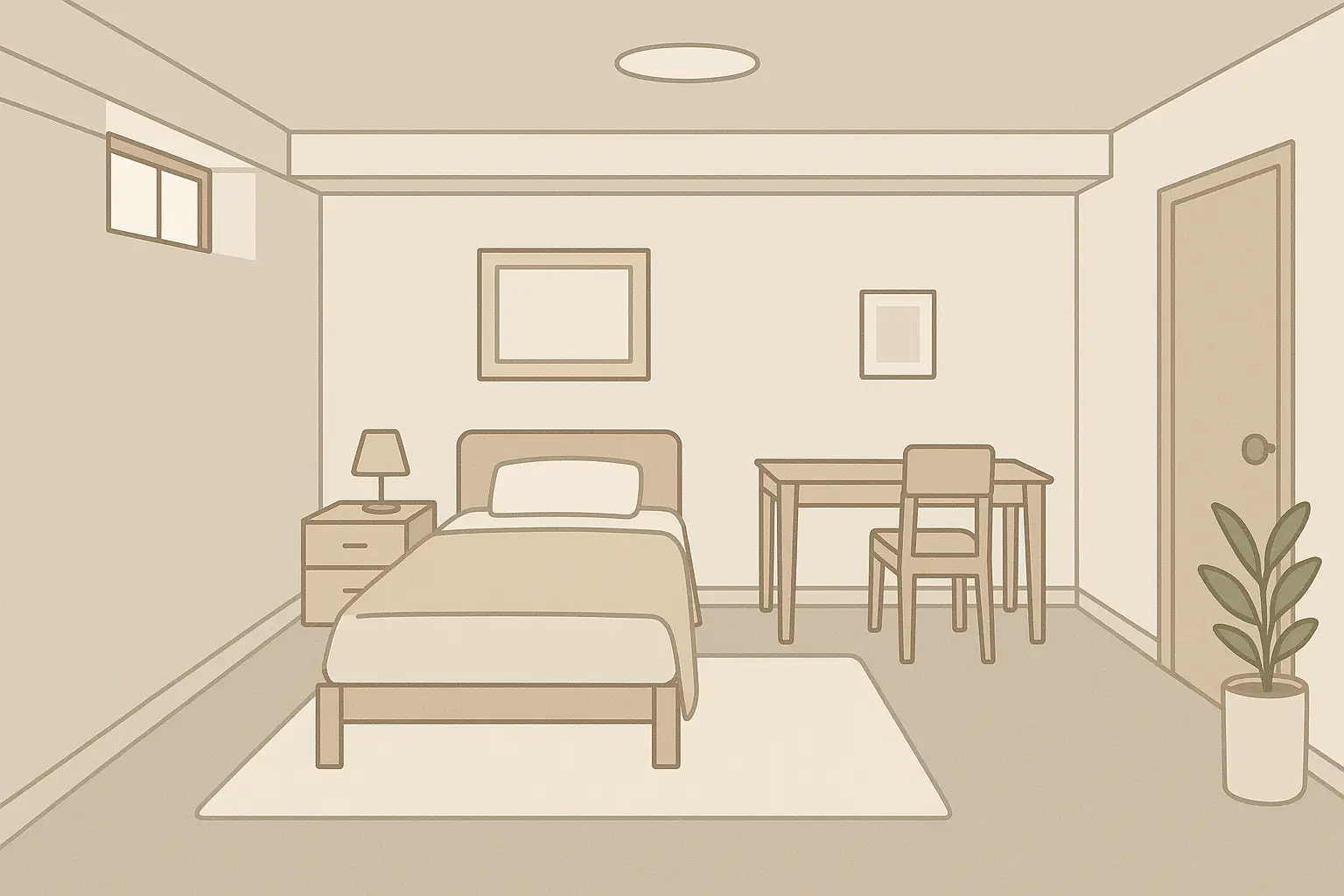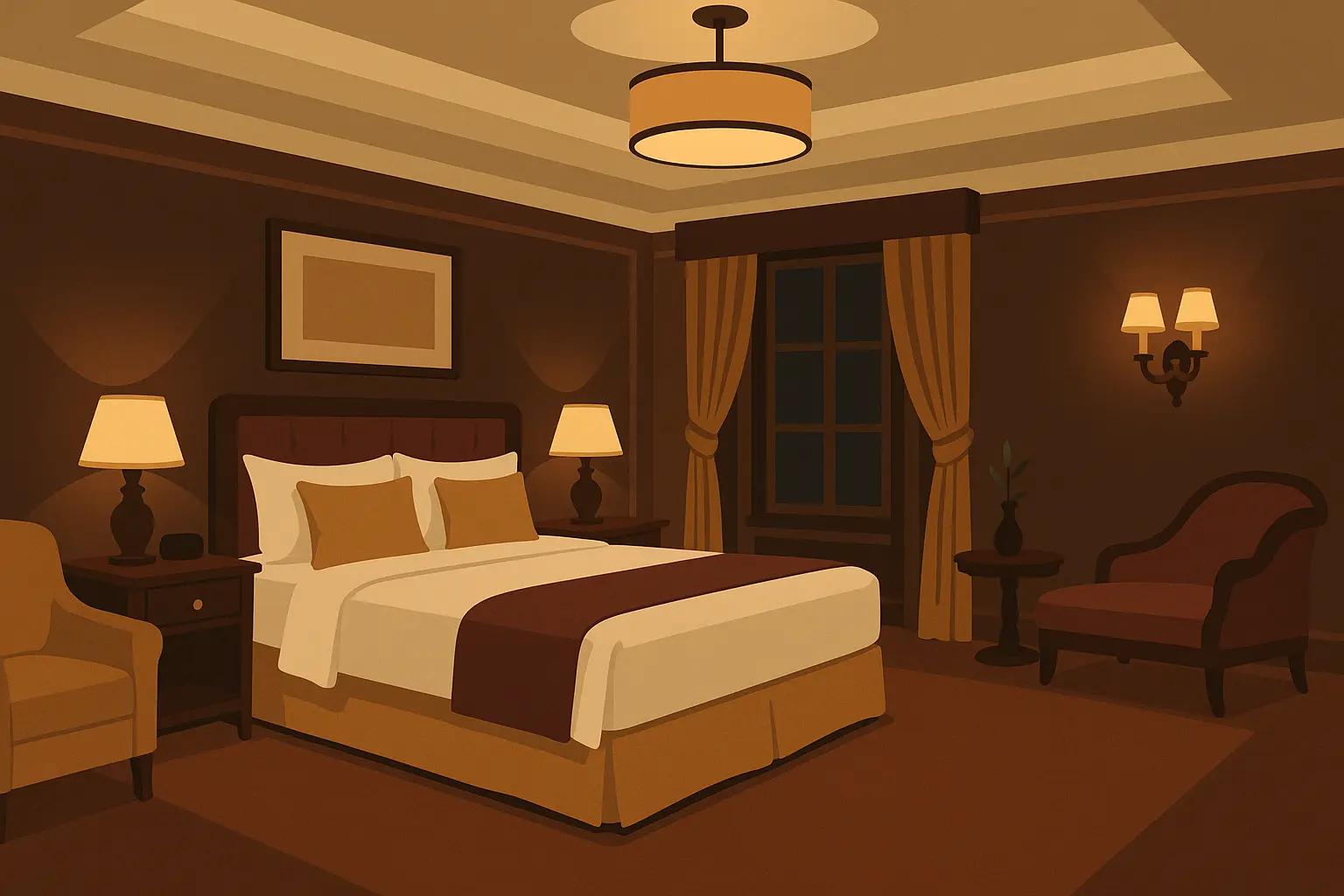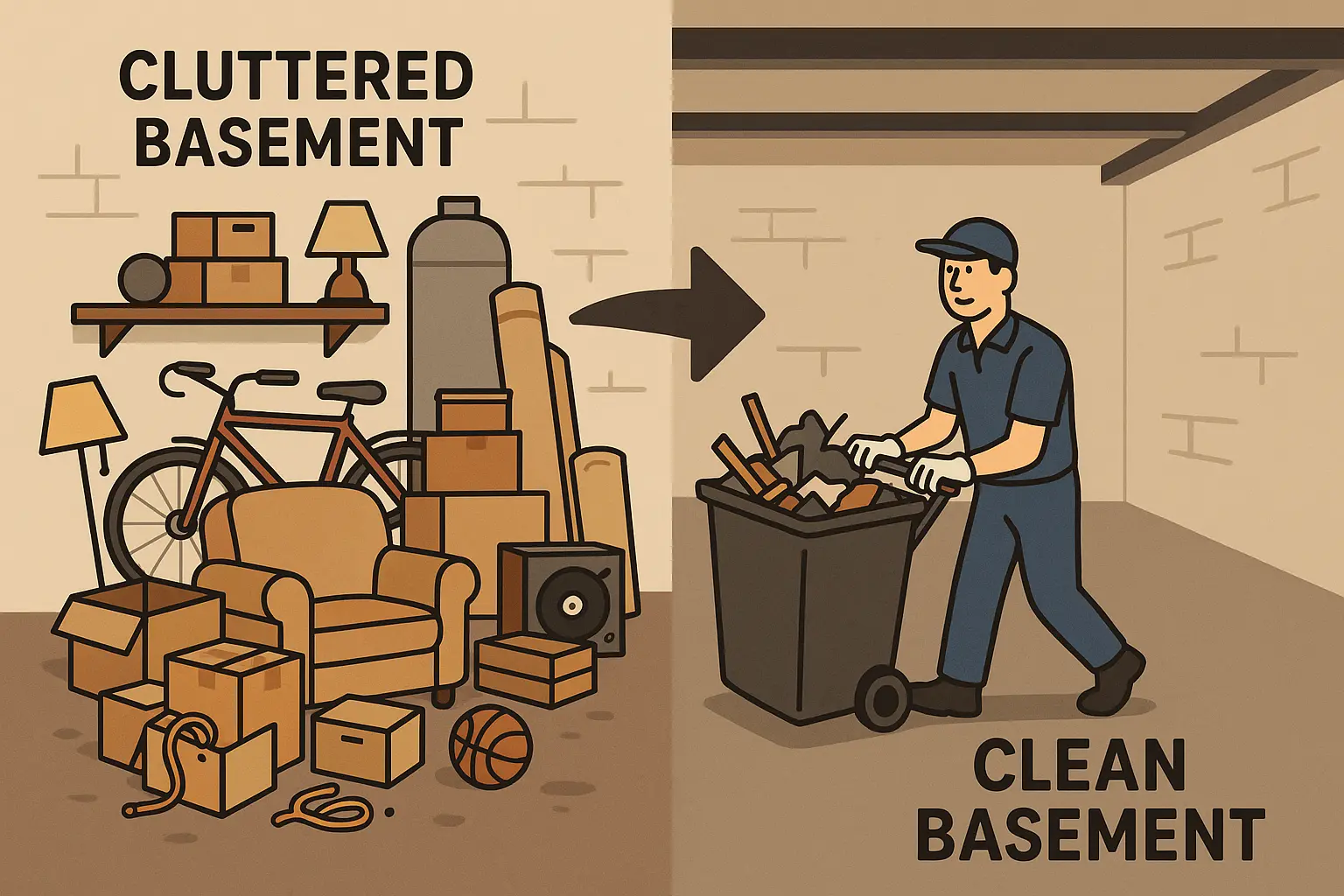25 Basement Bedroom Ideas That’ll Transform Your Underground Space Into a Dream Retreat
Table of Contents
-
Planning Your Basement Bedroom: Things You Need to Think About
-
Lighting Solutions That Banish the Cave Effect
-
Moisture Control and Climate Solutions for Year-Round Comfort
-
Space Optimization and Layout Strategies
-
Comfort and Luxury Features Worth the Investment
-
Design Themes and Aesthetics That Work Underground
-
How JiffyJunk Kickstarts Your Basement Transformation
-
Final Thoughts
TL;DR
-
Basement bedrooms need careful planning around moisture control, lighting, ceiling height, safety codes, and climate systems – but don’t let this scare you off
-
Smart lighting design with multiple sources can completely transform a dark basement into a welcoming bedroom space
-
Proper moisture management through dehumidification, waterproof flooring, and ventilation prevents costly damage and health issues
-
Simple space optimization tricks make low-ceiling basements feel larger and more functional
-
Luxury features like radiant heating and mini-split HVAC systems dramatically improve comfort levels
-
Different design themes from industrial chic to cozy cabin can work beautifully in basement settings
-
Professional junk removal creates the clean foundation needed before any basement bedroom renovation begins
Planning Your Basement Bedroom: Things You Need to Think About
Last winter, I helped my neighbor Tom turn his cluttered basement into a bedroom for his college-age daughter. What started as a scary concrete cave filled with Christmas decorations and broken exercise equipment became her favorite room in the house. But let me tell you – we learned some expensive lessons along the way that I want you to avoid.
According to Room for Tuesday, basement bedrooms can become some of the most beloved spaces in a home despite their challenges with low ceilings and tight budgets. I’ve seen this firsthand – my friend Sarah transformed her cramped basement into such a cozy guest retreat that visitors actually request to stay down there instead of the main floor guest room.
Moisture is the big scary monster you’ll hear everyone talk about, but honestly, it’s totally manageable once you know what you’re doing. You’re dealing with naturally humid conditions that can mess up everything from your flooring to your furniture if you ignore them. But here’s the thing – proper waterproofing, dehumidification, and ventilation aren’t just suggestions, they’re absolute must-haves. I once spent $800 on beautiful hardwood flooring for a basement bedroom, only to watch it warp and buckle within six months. Trust me – moisture-resistant everything isn’t just a suggestion, it’s a must.
Natural light is another challenge since most basements have those tiny, sad little windows (if any). This makes lighting design absolutely critical for creating a warm, welcoming atmosphere instead of that dreaded cave-like feeling. But don’t worry – I’ll show you some tricks that actually work.
Ceiling height can make you feel claustrophobic if you don’t handle it right. Every design choice should make the space feel bigger and taller, from paint colors to furniture selection. The good news? There are tons of visual tricks that work like magic.
Safety and egress requirements might sound boring, but they’re actually looking out for you. That egress window requirement? It’s so you can get out safely if something goes wrong. Plus, proper egress windows let in way more light than those tiny basement windows. Check your local building codes for minimum window sizes before you start planning.
You’ll need to think about heating, cooling, and air circulation since basements tend to be naturally cool and humid. But once you get this handled, your basement bedroom can be more comfortable than upstairs rooms.
Budget reality check – basement bedroom renovations can range from budget-friendly updates to luxury transformations. Be honest about whether this space is for personal use or potential rental income, because that’ll guide every decision you make.
|
What You’re Dealing With |
What You Need to Know |
What It’ll Cost You |
How Important Is It? |
|---|---|---|---|
|
Moisture Control |
Dehumidification, waterproofing, ventilation |
$2,000-$8,000 |
Can’t skip this |
|
Lighting Solutions |
Natural light, artificial lighting, electrical work |
$1,500-$5,000 |
Super important |
|
Safety & Egress |
Window installation, code compliance |
$3,000-$12,000 |
Can’t skip this |
|
HVAC Systems |
Heating, cooling, air circulation |
$2,500-$7,500 |
Really important |
|
Ceiling Height |
Paint, design tricks, structural changes |
$500-$5,000 |
Nice to have |
|
Budget Planning |
Material selection, labor costs, permits |
Varies |
Really important |
Lighting Solutions That Banish the Cave Effect
You know that feeling when you walk into a basement and immediately want to leave? That’s the cave effect, and it’s totally fixable. You just need to think like a lighting designer – which sounds fancy, but really just means using lots of different light sources.
1. Layered Lighting Design
Multiple light sources work magic in basement bedrooms. You’ll want to mix recessed ceiling lights with table lamps, floor lamps, and accent lighting to create layers of illumination. Warm-toned LED bulbs (2700K-3000K) help counteract that naturally cool basement feeling.
The beauty of layered lighting is you can adjust the mood throughout the day by switching different combinations on and off. Recessed lights won’t eat into your precious ceiling height, while moisture-rated fixtures handle the humid basement environment without issues.
Consider the Johnson family’s basement bedroom transformation. They installed six recessed LED lights on dimmer switches, added two bedside table lamps with warm bulbs, placed a floor lamp in the reading corner, and installed LED strip lighting behind the headboard. The result? Their guests consistently comment on how “un-basement-like” the space feels, with multiple lighting zones creating the perfect ambiance for any time of day.
2. Light Wells and Window Upgrades
Natural light makes the biggest difference in basement bedrooms. Installing or enlarging existing windows, adding light wells outside ground-level windows, or upgrading to egress windows brings in precious daylight while potentially meeting safety requirements at the same time.
Light wells require digging around your foundation, but the results are dramatic. You’re basically creating a small courtyard that funnels natural light down into your basement space. Just make sure you get the drainage right so you don’t create water problems.
3. Artificial Skylights and Light Tubes
LED skylight panels and solar tubes create convincing illusions of natural daylight streaming from above. These work particularly well when traditional windows aren’t possible due to structural limitations.
Modern artificial skylights use advanced LED technology to mimic how real sunlight changes throughout the day. Some models are flush-mounted to preserve your ceiling height while creating that crucial connection to the outdoors (even if it’s fake).
4. Mirror and Reflective Surfaces
Mirrors and reflective surfaces amplify whatever light you have available. Place large mirrors opposite light sources and incorporate reflective materials like metallic accents or glossy tiles to bounce light around the room.
This trick costs way less than installing new light fixtures but delivers impressive results. Vertical mirrors can make your ceilings appear higher, while strategically placed reflective surfaces create the illusion of windows where none exist.
5. Under-Bed and Accent Lighting
LED strip lights under beds, behind headboards, or along baseboards add ambient warmth without taking up any space. This technique works especially well when every square foot matters.
Under-bed lighting creates a floating effect that makes your bed appear to hover, adding visual interest while providing subtle nighttime navigation. LED strips can be moisture-resistant and consume minimal electricity, making them perfect for basement environments.
Moisture Control and Climate Solutions for Year-Round Comfort
Don’t let the moisture thing scare you off. Yeah, basements can be humid, but it’s totally manageable with the right approach. My friend Sarah’s basement bedroom has been perfect for three years now, and she started with zero DIY experience.
6. Dehumidification Systems
Think of dehumidifiers like air conditioners for moisture – they just suck the dampness right out of the air so your basement doesn’t feel like a swamp. Install whole-house dehumidifiers or high-capacity portable units to maintain that sweet spot of 30-50% humidity year-round.
These systems work beautifully with existing HVAC setups, running automatically to prevent mold and mildew before they start. The upfront investment pays for itself by protecting everything else you put into the space.
7. Waterproof Flooring Options
Here’s what I’ve learned about basement flooring the hard way:
-
Luxury vinyl plank – Looks like real wood, handles moisture like a champ, won’t break the bank
-
Regular hardwood – Just don’t. Seriously. I learned this one the expensive way
-
Polished concrete – Gives you that industrial-chic vibe and is practically indestructible
-
Ceramic tile – Bulletproof against moisture but feels cold (unless you spring for heated floors)
Modern LVP looks so real that guests won’t know it’s not actual hardwood until you tell them. I’m obsessed with those Coretec luxury vinyl planks – they look so real that my contractor asked where I got the “hardwood.” And at Home Depot, they’re usually around $4 per square foot.
|
Flooring Type |
Handles Moisture? |
What You’ll Pay |
How Long It Lasts |
Comfort Level |
|---|---|---|---|---|
|
Luxury Vinyl Plank |
Like a champ |
$3-8/sq ft |
Really well |
Pretty good |
|
Polished Concrete |
Perfectly |
$5-12/sq ft |
Forever |
Not super cozy |
|
Ceramic Tile |
Perfectly |
$4-15/sq ft |
Forever |
Pretty good |
|
Epoxy Coating |
Perfectly |
$3-7/sq ft |
Really well |
Not super cozy |
|
Rubber Flooring |
Perfectly |
$4-10/sq ft |
Really well |
Very comfortable |
|
Engineered Hardwood |
Terribly |
$6-14/sq ft |
Not great |
Very comfortable |
8. Vapor Barriers and Insulation
This is the boring stuff that happens behind the walls, but it’s absolutely critical. Install proper vapor barriers on walls and upgrade insulation to prevent condensation while improving temperature control throughout the year.
Whatever you do, don’t skip the vapor barrier. I’ve seen too many beautiful basement bedrooms ruined because someone thought they could save a few hundred bucks on “invisible” waterproofing.
9. Ventilation Improvements
Fresh air circulation removes humid air before it becomes a problem. Add exhaust fans, improve air circulation with ceiling fans, or install ERV systems for continuous fresh air exchange.
Ceiling fans serve double duty – they move air to prevent stagnation while creating the perception of higher ceilings through visual movement. ERV systems bring in fresh outdoor air while recovering energy from the outgoing stale air.
10. Drainage and Sump Pump Systems
Water accumulation spells disaster for basement bedrooms. Install or upgrade sump pumps, improve drainage around your foundation, and consider interior drainage systems for problematic areas.
Sump pumps work as your basement bedroom’s insurance policy, automatically removing water before it can cause damage. Proper drainage around your foundation prevents water from reaching your basement walls in the first place.
Space Optimization and Layout Strategies
Making every square foot count becomes crucial in basement bedrooms where ceiling height and floor space often feel limited. Here are six tricks that actually work to make basement bedrooms feel larger, more functional, and less confined.
11. Built-In Storage Solutions
Floor space is precious in basement bedrooms, so take storage vertical with custom built-ins, under-stair storage, and wall-mounted shelving. These solutions keep your belongings organized without eating into your walking space.
Under-stair areas often go unused, but they’re perfect for custom storage solutions. Built-in wardrobes, bookshelves, and storage benches can be designed to fit your exact dimensions and needs.
12. Murphy Beds and Space-Saving Furniture
Transform your small basement bedroom into a multi-purpose space with Murphy beds, folding desks, and furniture that serves double duty. These solutions allow you to reclaim floor space when the bed isn’t needed.
Murphy beds require adequate ceiling clear
Murphy beds require adequate ceiling clearance but offer incredible flexibility. During the day, your bedroom becomes a home office, exercise room, or entertainment space. The initial investment pays off through dramatically increased functionality.
The Martinez family installed a queen-size Murphy bed with an integrated desk in their 400-square-foot basement bedroom. During weekdays, their teenage son uses the space as a study area and gaming room. When grandparents visit on weekends, the bed folds down to create a comfortable guest suite. This dual functionality essentially gave them two rooms for the price of one renovation.
13. Open Concept Layouts
Knock down non-load-bearing walls to create larger, more open spaces that feel less confined. Open concepts allow light to flow throughout the entire basement while making the space feel significantly larger.
You’ll need structural evaluation before removing any walls, but the results can be dramatic. Open layouts make basement bedrooms feel more like modern loft spaces than underground rooms.
14. Ceiling Design Tricks
Low ceilings don’t have to feel oppressive. Paint ceilings in lighter colors, add vertical design elements, or install coffered ceilings to create the illusion of height.
Light ceiling colors reflect available light while drawing the eye upward. Vertical stripes, tall artwork, or floor-to-ceiling curtains (even without windows) create visual lines that make ceilings appear higher than they actually are.
15. Zoning with Room Dividers
Create separate areas for sleeping, working, and storage using curtains, sliding panels, or decorative screens instead of permanent walls. This approach maintains openness while providing functional zones.
Room dividers offer flexibility that permanent walls can’t match. Rearrange your layout seasonally or as your needs change without major construction. Curtains can create intimate sleeping areas while maintaining the overall sense of space.
16. Staircase Integration
Don’t treat your staircase as an obstacle – make it part of the design with under-stair storage, seating, or decorative elements. This approach maximizes otherwise wasted space while creating visual interest.
Under-stair areas can house everything from built-in desks to cozy reading nooks. Wine storage, bookshelves, or even a small powder room can fit under staircases, making them contribute to your basement bedroom’s functionality.
Comfort and Luxury Features Worth the Investment
Look, I’m not going to sugarcoat this – doing a basement bedroom right isn’t cheap. But you can absolutely do it in phases. Start with the must-haves (moisture control and basic lighting) and add the fancy stuff later. These five premium upgrades dramatically improve the basement bedroom experience and transform compromise spaces into preferred destinations.
17. Radiant Floor Heating
Cold floors disappear with radiant heating systems installed under your flooring. Electric or hydronic systems provide consistent warmth from the ground up, making basement bedrooms comfortable year-round.
Radiant heating works beautifully with moisture-resistant flooring options while providing more even heat distribution than forced-air systems. You’ll never again experience that shock of cold concrete or tile against bare feet.
18. Mini-Split HVAC Systems
Dedicated climate control makes basement bedrooms truly comfortable. Mini-split HVAC systems provide precise temperature control independent of your main house system while helping manage humidity levels.
Wall-mounted units don’t consume floor space while delivering both heating and cooling exactly where you need it. Many models include advanced filtration and humidity control features specifically designed for basement environments.
19. Luxury Bathroom Additions
Full or half bathrooms transform basement bedrooms into self-contained suites. Include proper ventilation, moisture-resistant materials, and spa-like features such as heated floors or towel warmers for maximum luxury.
Basement bathrooms require excellent ventilation and waterproofing due to increased moisture loads, but the convenience and privacy they provide make basement bedrooms feel like luxury hotel suites rather than basement accommodations.
20. Entertainment and Technology Integration
Basements excel as entertainment spaces due to their naturally quiet, enclosed environment. Install home theater systems, gaming setups, or smart home technology that takes advantage of these acoustic benefits.
Electronics generate heat and need protection from humidity, but basements offer the perfect environment for immersive entertainment experiences. Surround sound systems work beautifully in enclosed basement spaces without disturbing the rest of the house.
21. Wine Storage and Bar Areas
Cool basement temperatures create ideal conditions for wine storage and bar areas. Install sophisticated wine storage, wet bars, or beverage centers that capitalize on the naturally stable climate.
Controlled humidity levels actually benefit wine storage when properly managed. Bar areas add sophisticated entertaining options while taking advantage of the basement’s unique character and atmosphere.
|
Luxury Feature |
What You’ll Pay |
How Much Upkeep? |
Comfort Boost |
Worth It For Resale? |
|---|---|---|---|---|
|
Radiant Floor Heating |
$8-15/sq ft |
Barely any |
Huge |
Definitely |
|
Mini-Split HVAC |
$3,000-6,000 |
Some |
Big |
Maybe |
|
Full Bathroom Addition |
$15,000-35,000 |
Some |
Huge |
Definitely |
|
Home Theater System |
$5,000-25,000 |
Some |
Big |
Maybe |
|
Wine Storage/Bar |
$3,000-15,000 |
Barely any |
Nice to have |
Maybe |
|
Smart Home Integration |
$2,000-8,000 |
Barely any |
Nice to have |
Probably not |
Design Themes and Aesthetics That Work Underground
Choosing the right design theme can transform basement bedrooms from dark, cramped spaces into stylish retreats that celebrate rather than hide their underground location. Four distinct aesthetic approaches work particularly well in basement environments, each addressing common challenges in different ways.
22. Industrial Chic Design
Embrace your basement’s industrial bones with exposed brick, concrete walls, metal fixtures, and Edison bulb lighting. This urban loft aesthetic works naturally with basement architecture instead of fighting against it.
Industrial basement bedroom design often works with existing basement features, making it budget-friendly. Concrete and brick handle humidity beautifully, while exposed elements can actually make ceilings feel higher by eliminating dropped ceiling treatments.
23. Cozy Cabin Retreat
Transform your basement bedroom into a mountain cabin retreat with warm wood tones, stone accents, plaid textiles, and rustic furniture. This approach makes the underground location feel intentional and cozy.
Wood elements need moisture-resistant treatments in basement environments, but the results create incredibly welcoming spaces. Warm lighting enhances the cozy atmosphere while natural materials provide good insulation properties.
The Thompson family created a stunning cabin-themed basement bedroom using reclaimed barn wood for accent walls, a stone fireplace surround, plaid bedding, and rustic furniture pieces. They treated all wood with moisture-resistant sealers and added a small electric fireplace for ambiance. Guests consistently describe the space as “more comfortable than a luxury mountain resort,” and many request to stay there instead of the main guest room upstairs.
24. Modern Minimalist Approach
Focus on clean lines, neutral colors, minimal furniture, and clever storage solutions to create serene, uncluttered basement bedrooms. Minimalism maximizes perceived space through intentional simplicity.
Fewer items mean less humidity retention and easier maintenance. Clean design showcases your lighting effectively while making basement bedrooms feel more spacious and sophisticated than cluttered alternatives.
25. Luxury Hotel Suite Style
Create a five-star hotel experience with premium bedding, elegant furniture, sophisticated lighting, and spa-like amenities. This approach transforms basement bedrooms into spaces guests actively request.
Premium materials often handle moisture better than budget alternatives, making luxury finishes both beautiful and practical. Sophisticated lighting design becomes crucial for creating the refined atmosphere that defines high-end hotel experiences.
How JiffyJunk Kickstarts Your Basement Transformation
The hardest part of any basement project? Just getting started. If you’re staring at a basement full of stuff and feeling overwhelmed, you’re not alone. Sometimes the best first step is just clearing everything out so you can actually see what you’re working with.
Most basements accumulate years of “someday” items – old furniture, broken electronics, holiday decorations, unused exercise equipment, and countless boxes of forgotten belongings. That’s where basement cleanout services become invaluable.
JiffyJunk’s White Glove Treatment goes way beyond just hauling stuff away. They’ll clear everything from old furniture and appliances to construction debris, sort items for donation and recycling rather than dumping everything in landfills, then sweep and sanitize the area for a truly clean foundation.
Professional cleanout actually saves you money on your renovation. When contractors arrive to install moisture control systems, lighting, or flooring, they can focus immediately on the work rather than spending billable hours moving your belongings. Similar to how furniture removal requires strategic planning, JiffyJunk’s efficient service keeps your renovation on schedule and within budget.
Whether you’re planning a cozy guest retreat, luxury basement bedroom for yourself, or rental space for additional income, JiffyJunk handles the overwhelming first step so you can focus on the exciting transformation ahead.
Fair warning – this isn’t a weekend project. Between waiting for permits, dealing with contractors, and letting things dry properly, most basement bedroom projects take 2-3 months. But hey, good things take time, right?
Ready to start your basement bedroom project? Contact JiffyJunk for a free estimate on cleanout services and take the first step toward creating your dream underground retreat.
Final Thoughts
Transforming your basement into a beautiful bedroom requires some planning around moisture, lighting, space, and comfort challenges, but trust me – the results can blow your mind. The 25 basement bedroom ideas we’ve covered range from essential basics like dehumidification and waterproof flooring to luxury upgrades like radiant heating and spa-like bathrooms.
Success comes from handling the fundamentals first – moisture control, proper lighting, and safety requirements – before moving on to the fun aesthetic and comfort features. Your basement bedroom can become one of your home’s most beloved spaces when you approach the project systematically and invest in solutions that address the unique challenges of underground living.
Whether you’re creating a basement guest room for visitors or developing a finished basement with bedroom space for family members, these basement bedroom ideas provide the roadmap for transformation. From cozy retreats to luxury suites, your basement bedroom can rival any upstairs accommodation with proper planning and execution.
Look, I know this moisture control and planning stuff sounds overwhelming, but once you get it handled, the rest is just fun decorating. And trust me, there’s nothing quite like the satisfaction of turning that scary basement into a space people actually fight over.
Remember that professional preparation makes all the difference. Starting with a completely cleared, clean space allows you to focus on creating the basement bedroom of your dreams rather than working around accumulated clutter and obstacles.
